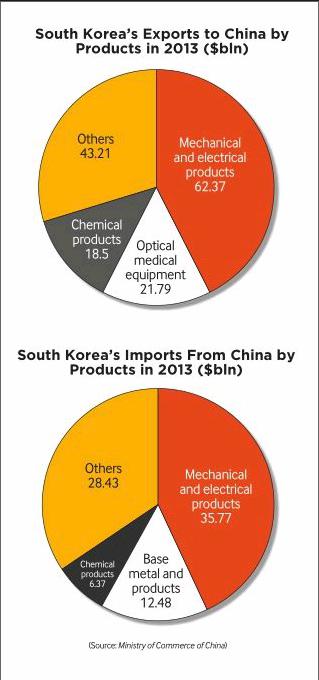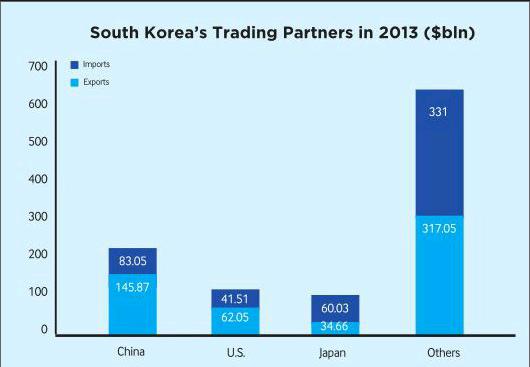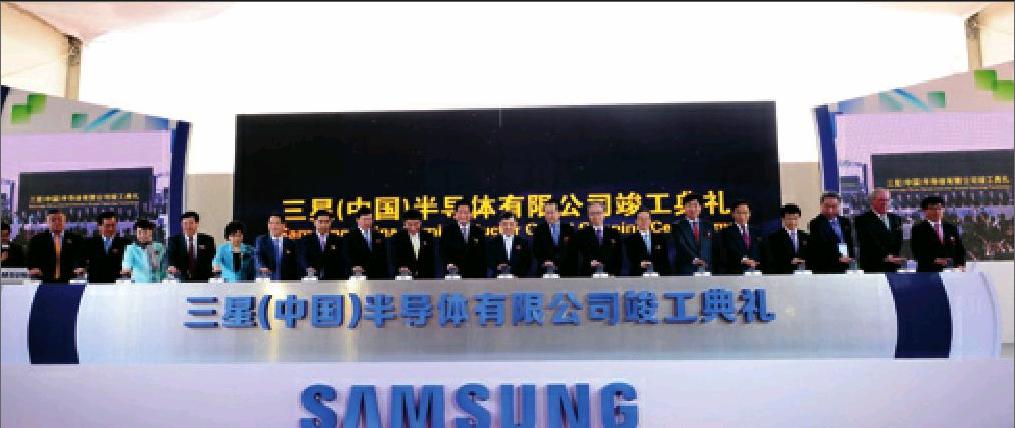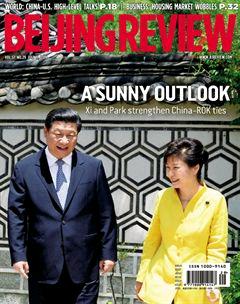FORESEEABlE PROGRESS
By+Yu+lintao



While China and the Republic of Korea(ROK) relations have been in a state of close economic ties, the two countries are now moving to forge stronger political ties as well—as evidenced by Chinese President Xi Jinpings Seoul tour in early July. His visit helped to map out a clearer course for the future of bilateral relations and showed Chinas commitment to regional stability in the Peninsula.
Deepening mutual trust
President Xis first trip as Chinese President to the Korean Peninsula was also his first overseas trip exclusively to one country. The dedicated nature of President Xis trip to the ROK demonstrates the high importance that China attaches to China-South Korea relations, said Gao Fei, a professor on international studies at the Beijing-based China Foreign Affairs University (CFAU). “Since diplomatic relations were established in 1992, bilateral ties have undergone positive and upward development, making big steps forward every five years or so,” he said.
Gao added that Xis Seoul tour could be seen as a reciprocation for South Korean President Park Geun Hyes state visit to China in June 2013.
Parks China trip last year put an end to Seouls annual diplomatic routine of visiting Tokyo ahead of Beijing.
During Parks visit, the two heads of state held talks in Beijing, and pledged to boost cooperation and issued a joint statement along with an action plan to enhance their strategic partnership.
Through their latest meeting, observers said, the two presidents have ushered in a new era in bilateral relations featuring “comprehensive upgrading” and “strengthened political and economic ties.” Agreements reached include deals for the launch of a renminbi clearing service in Seoul, greater political and security cooperation, and expanded people-to-people exchanges.
Xis latest visit further enriched the two countries strategic cooperative partnership and pointed the way to future development of bilateral ties, said yang Xiyu, a senior researcher with the China Institute of International Studies (CIIS).
South Korean scholars shared similar views. In interviews with Chinas Xinhua News Agency, Kim Han Kwon, Director of the Center for China Studies at the Asian Institute for Policy Studies in South Korea, said Xis visit has bolstered the two countrys cooperation in such fields as security, economy and culture.
“It is a boost not only to the political trust between leaders of the two countries, but also to the friendship between the two peoples. It has put a new driving force behind the future development of relations between South Korea and China,” added Kim.
Ha young Ae, a professor at Kyung Hee University, said Xis visit has won the confidence of the South Korean public in the development of ties between the two countries. Ha told Xinhua that she would encourage her students to carry forward the South Korea-China friendship and shoulder the heavy responsibility of Asias peaceful rejuvenation.
Reinvigorating economic ties
Xis trip has been an impetus for major progress in the China-South Korea free trade agreement(FTA) negotiations. During the visit, Xi and Park agreed to try to conclude FTA negotiations by the end of this year.
The FTA talk was launched in May 2012 with a goal of reaching a comprehensive, balanced and high-level FTA. The 12th round of talks is scheduled for later this month in South Korea.
After more than two decades of rapid development, bilateral economic and trade relations have matured and both countries are now in search of new opportunities. China is now South Koreas largest trading partner, largest market for exports, largest source of imports, and largest destination for overseas investment. South Korea, in turn, was Chinas third-largest trading partner and fifth-largest source of foreign investment in 2013. Statistics from Chinas General Administration of Customs show that Chinas two-way trade with South Korea totaled$274.25 billion last year, indicating an annual increase of 7 percent. The figure equates to South Koreas trade volume with the United States and Japan combined. The leaders of the two countries have also promised to raise that figure to $300 billion by 2015.
The FTA, when finalized, is expected to help the two countries improve the mutual complementarity of their markets and strengthen the foundation for regional economic integration. The FTA negotiation is said to be one of the three major negotiations this year which will, to some extent, determine whether bilateral trade will reach the promised$300 billion next year. South Korea would thereby reinforce its position in the Chinese market and pave the way for China to set up FTAs with other world players.
yang of the CIIS said the establishment of the ChinaSouth Korea FTA will not only increase the scale of bilateral trade in goods but also upgrade the “quality” of cooperation, providing new opportunities in emerging industries such as e-business, environmental protection as well as financial services.
Joining Xis trip were over 250 Chinese entrepreneurs from the manufacturing, finance and IT sectors. Among them were Jack Ma, Executive Chairman of Alibaba Group, Ren Zhengfei, President of Huawei Technologies, and Li yanhong, Board Chairman of search engine Baidu. The entrepreneurs have had their eye on potential business opportunities in the country which may arise once the bilateral FTA is established.
In addition, yang said the FTA could also serve as an institutional support for bilateral economic ties. Moreover, the move will set a good example for the free trade framework of Northeast Asia. China, Japan and South Korea had agreed to set up a trilateral FTA, but due to certain issues—mainly concerning Japan—the trilateral FTA came to a deadlock.
“The China-South Korea FTA may kickstart the trilateral FTA talks, especially given the current chaotic state of political and security matters in the region,” said yang.
Professor Gao of the CFAU echoed yangs remarks, adding that the China-South Korea FTA could even lay the groundwork for the Regional Comprehensive Economic Partnership (RCEP).
Comprising 10 ASEAN member nations as well as China, South Korea, Japan, India, Australia and New Zealand, the RCEP aims to integrate all of ASEANs existing FTAs into one system. Upon its completion, it would account for over 30 percent of the worlds GDP and cover about 45 percent of the global population.
Wei Zhijiang, a professor of South Korean studies with Zhongshan University in south China, said the FTA will bring concrete benefits to the peoples of both countries. “Once the FTA is established, South Koreans will have access to much cheaper agricultural products from the Chinese mainland while Chinese people will be able to purchase cheaper cars produced by Hyundai,” he said.
Another tangible result of the visit was a memorandum of understanding between the two central banks on renminbi clearing in Seoul—a development that will push forward direct trading of the yuan with the won, the South Korean currency. The move would eliminate the need to exchange either currency into U.S. dollars when settling accounts, and it is believed that it would save transaction fees and hedge against foreign exchange volatility. In addition, China will grant an 80 billion yuan ($13 billion) quota of investment to South Korea under the Renminbi Qualified Foreign Institutional Investors (RQFII) program. Launched in 2011, the RQFII program allows foreign investors to invest in Chinese onshore stock and bond markets with offshore renminbi.
Observers said the new deal will also encourage the use of renminbi by banks and businesses in international transactions. Seouls bid to become an offshore center for the renminbi has enjoyed increasing international popularity, backed by Chinas rapidly stabilizing economy.
“The direct trading of the yuan against the won would not only reduce the trans-action costs for enterprises from the two countries, but could also be helpful for promoting the internationalization of the two currencies,” Wei said.
In the last year, the worlds second largest economy has reached agreements with Germany, Britain, France and Luxembourg to open local renminbi trading hubs, as the Chinese currency has been increasingly used in global trade and investment. The Chinese currency rose to become the seventh most used payment currency globally earlier this year. RMB payments grew by 29 percent month-on-month in March with a market share of 1.62 percent, up from 1.42 percent in February, according to global transaction service firm SWIFT.
Professor Gao noted that setting up a renminbi clearing hub in Seoul is a significant step for China-South Korea financial cooperation.
“Unlike establishing a renminbi trading center in London or Luxembourg, China and South Korea enjoy much closer trade relations and a large bilateral trade volume—their financial cooperation is thus strongly supported by real economies,” said Gao. The new move is both helpful for promoting the economic status of South Korea worldwide and conducive for the internationalization of the renminbi, he added.
Promoting regional security
During Xis visit, the two leaders reached important consensus on the Korean Peninsula issue, pledging that the two countries are firmly committed to pushing for a nuclear-free Peninsula, maintaining peace and stability in the region, as well as promoting the Korean Peninsula denuclearization process and facilitating resumption of the six-party talks.
In their meetings, President Xi responded positively to Parks proposal of a “Korean Peninsula trust-building process” and voiced his support for the improvement of relations between North Korea and South Korea to realize reconciliation and cooperation and ultimately achieve independent peaceful reunification.
Xi also pointed out that all sides should be treated in a balanced way to guide the nuclear issue into a sustainable, irreversible and effective settlement process.
Gao said the consensus has demonstrated the increasing mutual trust between the two countries over the highly sensitive Korean nuclear issue.
Naturally, China and South Korea are major stakeholders in the Korean Peninsula issue, as it concerns the core interests of both countries. Moreover, a nuclear-free and peaceful Korean Peninsula is crucial for all countries in the wider Asia-Pacific region.
Observers also claimed the latest mutual visits by Park and Xi show that both leaders have broken with the traditional mindset that has inhibited their bilateral relations. They attempted to eliminate the external factors limiting China-South Korea cooperation. Xis Seoul trip even put an end to an unspoken diplomatic routine wherein China would first visit Pyongyang before moving on to Seoul.
In the meantime, observers noted that as Beijing and Seoul draw closer, Pyongyang has become more active in negotiations with Tokyo over the issue of its past abductions of Japanese nationals. The two sides had a meeting in Beijing on July 1. On July 3, Japanese Prime Minister Shinzo Abe announced that Japan would partially lift its sanctions imposed on Pyongyang.
In recent years, due to the rightward shift in Japanese politics, its attitude toward its war past has drawn criticism from both China and South Korea, the two major victims of Japans war crimes. Most recently, despite pronounced international concern, Abe has gutted Japans pacifist Constitution in order to allow Japanese forces to fight abroad. Given Abes unrepentant historical attitude, the move poses a grave menace to regional stability.
During their meeting, Xi and Park expressed worries about Japans continued historical revisionism and its attempt to expand the right to self-defense.
In addition, Anbound Consulting, an independent think tank in Beijing, claimed that Japan is also concerned about the ChinaSouth Korea FTA. Japan, which is currently engaging in the Trans-Pacific Partnership(TPP) negotiations, worries the China-South Korea FTA will have an impact on the TPP—an agreement that intends to enhance trade and investment among a host of countries but which, notably, does not include China and South Korea.

